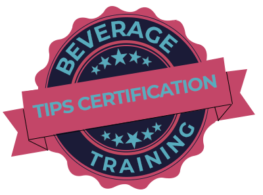In the state of Iowa, responsible alcohol service and the safety of patrons are paramount concerns for businesses in the hospitality and beverage industry. Additionally, the Iowa TIPS Certification stands as a vital program designed to equip individuals working in the service of alcohol with the knowledge and skills needed. This program ensures the responsible consumption of alcohol and maintains a safe and enjoyable environment for all.
This certification program serves as a valuable resource not only for bartenders, servers, and hospitality staff but also for owners and managers of establishments that serve alcohol. It empowers participants with the tools to prevent alcohol-related incidents, underage drinking, and overconsumption, all while complying with Iowa’s legal regulations.
Iowa TIPS Certification Training Program
| Course Name | Hours | Price | Checkout |
|---|---|---|---|
| TIPS Iowa On-Premise Alcohol Server Training + Food Handler | 5 | $47.00 | Enroll |
| TIPS Iowa On-Premise Alcohol Server Training | 3 | $38.00 | Enroll |
| TIPS Iowa Off Premise Alcohol Seller Training | 3 | $38.00 | Enroll |
| TIPS Replacement Card | $20.00 | Enroll |
In this comprehensive guide, we will explore the significance of Iowa TIPS Certification, the key components of the program, the benefits it offers, and how it contributes to a safer and more responsible alcohol service industry in the state of Iowa. Whether you are a seasoned professional or new to the industry, understanding the importance of this certification is essential for the well-being of your patrons, your establishment, and the broader community.
Iowa TIPS Certification is a Mandatory Requirement?
While the state of Iowa does not currently enforce mandatory responsible alcohol training, it is highly recommended that anyone involved in the sale or service of alcoholic beverages within Iowa consider undertaking and successfully completing a responsible alcohol course. This proactive step not only serves to safeguard individuals in their roles but also provides a crucial layer of protection for employers, reducing the risk of potential legal complications.
Responsible server training is of paramount importance for several compelling reasons. Firstly, it plays a pivotal role in promoting public safety and preventing alcohol-related incidents. Additionally, by equipping servers and bartenders with the knowledge and skills needed to identify signs of intoxication, refuse service to patrons who are already impaired, and implement responsible alcohol service practices, this training helps mitigate the risks associated with overconsumption. Moreover, it ultimately contributes to the creation of safer environments in bars, restaurants, and other establishments serving alcohol. This, in turn, reduces the likelihood of accidents, violence, and impaired driving incidents that can have devastating consequences for individuals and communities.
Secondly, responsible server training is crucial for legal and liability purposes. In many jurisdictions, establishments that serve alcohol can face significant legal consequences if they overserve customers or allow underage drinking to occur on their premises. By having certified Responsible Alcohol Servers on staff, these establishments demonstrate a commitment to compliance with local and state alcohol laws. Furthermore, this not only helps protect them from legal liability but also safeguards their reputation within the community. It’s a proactive measure that shows patrons and authorities that the establishment takes its social responsibility seriously and is dedicated to ensuring the well-being of its customers.
Why is it Essential to take Iowa TIPS Certification Course?
Many insurance companies and employers encourage their staff to obtain alcohol server training certification. In return, this not only provides numerous benefits but also shields them from various legal penalties and fines. Employers aspire for their complete staff to be well-trained, ensuring a comprehensive understanding of their roles. Furthermore, insurance companies understand that individuals applying for specific jobs gain an advantage over those who haven’t enrolled and completed the alcohol server certification course. Being certified may make it easier to get hired.
In addition to protecting oneself and the employer from legal liability, acquiring knowledge in safe and legal alcohol service can contribute to safeguarding the general public from the dangers of drunk driving.
What is IPACT and why one should participate in IPACT?
IPACT basically stands for Iowa Program for Alcohol Compliance Training, the aim of I-PACT is to promote greater voluntary adherence to the state’s alcohol regulations through a combination of educational initiatives and enforcement measures. At its core, the program is designed to prevent unlawful alcohol sales by instructing alcohol retailers and heightening their awareness regarding modifications to Iowa’s liquor legislation.
Who need’s TIPS Certification Training?
The Iowa Alcohol Server course is specifically designed to cater to individuals involved in the sale of alcoholic beverages, whether it be on or off premises. This includes a wide range of professionals, such as bartenders, restaurant servers, as well as cashiers working in package stores, convenience stores, and supermarkets.
This training is particularly suitable for the following roles:
- Bartenders
- Waiters and Waitresses
- Cashiers
- Bar and Restaurant Managers
- Assistant Managers
- Sommeliers and Wine Servers
- Hospitality Workers
- Catering Staff
- Event Organizers
- Other professionals engaged in alcohol sales
While it’s important to note that Iowa currently does not mandate alcohol seller-server training, this course aims to impart valuable knowledge about responsible alcohol service. Proper training is essential for all individuals involved in selling or serving alcohol, as it helps prevent alcohol-related incidents and mitigates the risk of costly legal actions.
What’s the Minimum Age to Serve and Consume Alcohol in Iowa?
The minimum age to serve alcohol is 18 years, and the minimum age to consume alcohol is 21 years.
For how long is Iowa seller-server certificate valid?
The certificate will remain valid for 3 years from the date of its successful completion.
